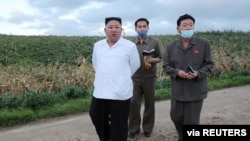Negotiations with North Korea have been stalled for months, but if and when they resume, the United States and South Korea should ensure the talks incorporate concerns about North Korean human rights abuses, the United Nations’ human rights office in Seoul said Tuesday.
Activist groups have long complained that human rights were not discussed during the 2018-19 North Korea talks, which focused on eliminating North Korea's nuclear weapons and improving Pyongyang’s relations with Washington and Seoul.
"Human rights issues have so far not been part of this process, and the voices of the people of the Democratic People’s Republic of Korea, including women, have been absent," said a report published Tuesday by the U.N. Office of the High Commissioner for Human Rights in Seoul.
The paper, presented at the South Korean government-hosted Korea Global Forum for Peace, said Seoul and Washington should “integrate human rights into the peace and denuclearization talks” and “promote a participatory and inclusive peace process" by involving escapees living outside North Korea.
Escapee complaints
The report was based on interviews with 63 people who recently left North Korea, mostly in 2018 and 2019. Many expressed concerns that Pyongyang’s rights abuses have been ignored.
“This is a disappointment to escapees living in South Korea because, in the past, both the United States and South Korea raised North Korea’s human rights issues but, with the start of the summits, the human rights agenda has disappeared,” lamented one escapee quoted in the report.
Since the start of 2018, North Korean leader Kim Jong Un has met three times with U.S. President Donald Trump and conducted three summits with South Korean President Moon Jae-in. North Korea eventually walked away from the talks, after the United States refused to relax sanctions and provide security guarantees.
Some members of the Trump administration have raised concerns about North Korean human rights abuses. But Trump himself rarely mentions the issue.
Rationale
South Korea’s left-leaning government also shies away from criticizing North Korean human rights abuses. Instead, Seoul prefers to focus on expanding ties with Pyongyang, hoping that will someday lead to a unified Korea that would respect human rights. A more aggressive approach, they argue, not only prevents reunification but also could lead to hostilities.
“We cannot be too competitive in discussing this human rights issue," said Kyung-ok Do, a research fellow at the Seoul-based Korea Institute for National Unification. "That will…ignite resistance on the North Korean side and put us even further away from peace and the protection of human rights."
North Korea consistently ranks at or near the very bottom of most global human rights rankings, but often becomes enraged when other countries or international bodies mention its rights violations.
Earlier this year, North Korea lashed out at defector activists in South Korea who often float anti-Pyongyang leaflets and other materials into North Korea. At one point, North Korea demolished its de facto embassy with the South, citing the leaflets as a pretext.
South Korea crackdown
South Korea responded by carrying out a wide-ranging crackdown on North Korea-focused rights groups, including many run by defectors. Many of the NGOs have said the crackdown risks stifling the entire North Korean human rights movement in South Korea.
Officials with the U.N. Human Rights Office in Seoul have criticized Seoul’s NGO moves, saying it is important to continue highlighting the concerns of North Korean escapees.
Among the urgent human rights issues to be addressed, according to the escapees mentioned in the U.N.’s latest report: discrimination based on family background, torture and ill-treatment, sexual abuse, inhumane conditions in prisons and detention facilities, and the existence of political prisons.
“I strongly suggest that discussions on human rights issues take place,” said one escapee quoted in the report. “Without human rights issues discussed, no other issues can be properly addressed.”




